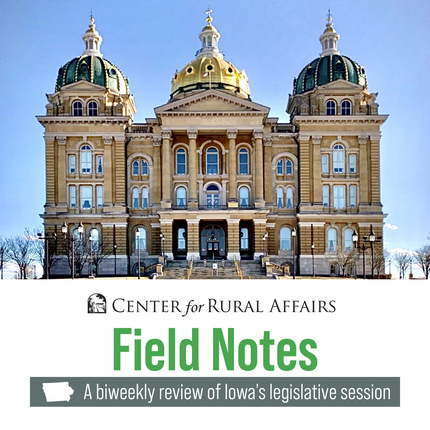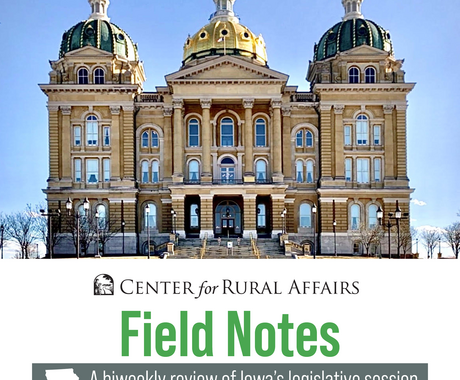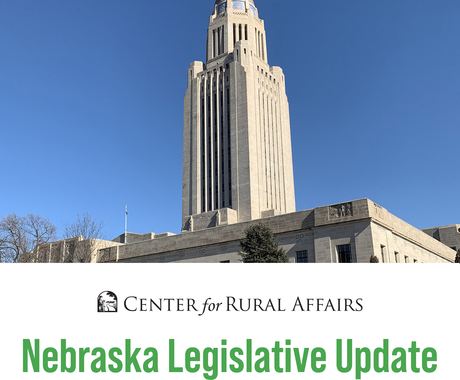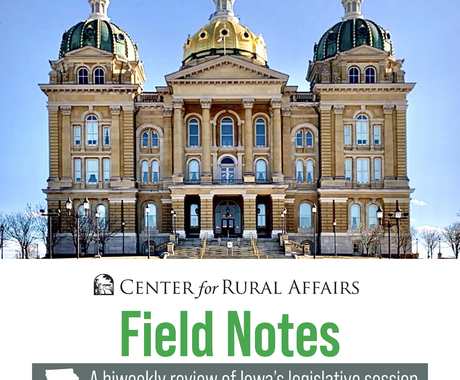Over the past couple of weeks, Iowa legislators have spent hours debating bills on the floor. Week nine of the 2024 session will look the same as we approach the second funnel, the March 15 deadline by which bills must pass through one chamber and out of a committee in the opposite chamber to remain alive.
Additionally, funding and tax bills continue to be introduced, assigned to subcommittees, and considered by their respective full committees (primarily Appropriations or Ways and Means). These bills are not subject to the second funnel deadline and may be worked on at a slower pace.
The Center continues to track the progress of our priority bills as they move through the legislative process.
House File (HF) 2599, which would create the Grocer Reinvestment Fund and Program, remains in the House Appropriations Committee. This bill is not subject to the funnel deadline, but we hope to see action soon.
HF 2614, a bill with language impacting Watershed Management Authorities (WMA), was passed out of an appropriations subcommittee last week. The bill will be considered and need to pass through the full Appropriations Committee before heading to the floor for debate.
We are maintaining advocacy efforts with individual legislators about these bills and through other opportunities, including the Iowa Farmers Union Lobby Day and the Iowa Environmental Council’s Advocacy Day.
If you have any questions, or would like to share the rural issues important to you, please do not hesitate to reach out at cynthiaf@cfra.org or 402.687.2100 ext. 1034.
Thank you for making your rural voice heard.
Rural grocery
House File (HF) 2599 — Support: Rep. Brian Lohse introduced this bill in the House, and Rep. Chad Ingels has been serving as the floor manager. This Center priority bill would create the Grocer Reinvestment Fund and Program, appropriate money from the general fund, and give the Iowa Economic Development Authority direction to create a grant program for new or current grocery stores located in areas that are both underserved and low or moderate income. The legislation would prioritize cost-saving efforts and business efficiency measures to ensure the long-term sustainability of locally owned grocery stores. Additionally, this bill includes modifications to Iowa Code under the Local Food and Farm Program. It changes the purpose and goals of the program to include and increase the sale of local food in grocery stores. The bill now is amended to include a local produce processing grant program. Priorities will be given to entities planning to increase the availability, access, efficiency, and capacity of local foods in Iowa. The House Economic Growth and Technology Committee met on Feb. 14 and recommended passage with the amendment. The bill is now renumbered and has been referred to the Appropriations Committee.
Watch: Rural Rapport: Heart of the Community: The Importance of Locally-Owned Grocery Stores
Water quality
HF 2614 — Monitor: Introduced in the House Agriculture Committee, this bill relates to the conservation and improvement of soil and water resources, including a name change and presenting restrictions on Watershed Management Authorities (WMAs) in Iowa. The bill would allow soil and water conservation districts to broaden their purview by prioritizing soil health. The language would require the WMAs to spend all money on water quality nutrient reduction projects on practices designated by the Iowa Nutrient Reduction Strategy. The amendment approved through the Committee ahead of the funnel now strikes the water quality education and assessment restriction, but there are still limitations on how the money can be spent. There is not a companion bill in the Senate. After being referred to the House Appropriations Committee, the subcommittee was held on Feb. 29 and representatives recommended passage of the bill with a 2-1 vote.
Renewable energy
SSB 3180 — Support: Introduced by Chairperson Waylon Brown, this bill would establish a community solar program with electric public utilities and set standards for billing methods. Currently, there are community solar programs that exist in Iowa, but this legislation would require public utilities to provide bill credits to subscribers of an independently owned project for their share of the energy produced by the project. This bill was introduced on Feb. 13 and passed out of the full Commerce Committee on Feb. 14 to clear the first funnel. There have been no updates since then.
HF 2279 — Monitor: Introduced by Reps. Hans Wilz, Brian Lohse, and Sean Bagniewski previously as HSB 555, this bill offers several amendments related to public utility laws, including the elimination of a reporting requirement for the Small Wind Innovation Zone program. Most notably, however, the bill would add nuclear and electric storage units to the definition of alternate energy production facilities. This adjustment would allow public utilities to include energy storage in advanced ratemaking cases, an important step in adequately planning for future public energy projects. The bill passed out of the House Commerce Committee on Jan. 30 and was placed on the House calendar on Feb. 1.
Other bills of interest
HF 2510/Senate File (SF) 2209 — Support: Proposed by the Iowa Department of Agriculture and Land Stewardship, this legislation relates to programs and regulations administered by the department. The Center supports two key components of the bill. The Choose Iowa Promotional Program provides consumers an opportunity to purchase food originating in the state, which is designated with the Choose Iowa logo. This legislation also creates the Value-Added Grant Fund and Program, which supports projects and services that add value to agricultural commodities produced in Iowa. These companion bills were assigned to subcommittees in their respective chambers and were both recommended for passage.
HF 2257/SF 2207 — Support: Proposed by the Iowa Department of Agriculture and Land Stewardship, this legislation proposes an amendment to the Meat and Poultry Inspection Act. The amendment would allow poultry processors to engage in custom operations if they maintain their state-licensed inspections. All packages processed on a custom basis must be marked “not for sale” and kept identified until the owner picks up the order. The House version of the bill passed unanimously through floor debate on Feb. 26 and will be considered on the Senate floor soon.
HF 2246 — Monitor: Introduced by Rep. Jacob Bossman, this bill relates to the creation of land redevelopment trusts. It would provide a tool for municipalities to pool their resources into a new entity – Land Redevelopment Trust – to acquire and redevelop blighted land. The Trust would be a public agency, so public transparency laws and processes would apply. The bill was referred to Ways and Means and has been assigned a subcommittee. They were scheduled to meet on Feb. 28, but the meeting was canceled and has not been rescheduled.
HSB 722 — Monitor: Introduced by Chairperson Bobby Kaufmann on the Ways and Means Committee, this bill relates to tax credits being awarded by the Iowa Economic Development Authority for capital contributions made to the Certified Rural Business Growth Fund for investments in qualified businesses. Limits are being offered for who can receive money from the fund. It should support rural communities across the state of Iowa. A subcommittee met to discuss the bill and recommended passage on Feb. 27.
SF 2400 — Monitor: Introduced by Sen. Dawn Driscoll, this bill excludes the net capital gain from the sale of breeding stock from the computation of net income for purposes of the individual income tax. The bill currently clarifies that the farmer must make at least 50% of their income from that line of business to be eligible for the exemption. If eligible, it would remove the capital gains tax from selling their breeding stock. This bill was referred to Ways and Means and assigned to a subcommittee on Feb. 29. No further action has been taken.





